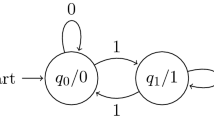Abstract
Lech proved in 1953 that the set of zeroes of a linear recurrence sequence in a field of characteristic 0 is the union of a finite set and finitely many infinite arithmetic progressions. This result is known as the Skolem–Mahler–Lech theorem. Lech gave a counterexample to a similar statement in positive characteristic. We will present some more pathological examples. We will state and prove a correct analog of the Skolem–Mahler–Lech theorem in positive characteristic. The zeroes of a recurrence sequence in positive characteristic can be described using finite automata.
Similar content being viewed by others
References
Abramovich, D., Voloch, J.F.: Toward a proof of the Mordell–Lang conjecture in characteristic p. Int. Math. Res. Notices 5, 103–115 (1992)
Bell, J.: A generalized Skolem–Mahler–Lech theorem for affine varieties. math.NT/0501309 (preprint)
Bézivin, J.-P.: Suites récurrentes linéaires en caractéristique non nulle. Bull. Soc. Math. France 115, 227–239 (1987)
Eisenbud, D.: Commutative Algebra – with a View toward Algebraic Geometry. Springer, New York (1994)
Evertse, J.-H., Schlickewei, H.P.: The absolute subspace theorem and linear equations. In: Number Theory in Progress, vol. 1, pp. 121–142. de Gruyter, Berlin (1999)
Evertse, J.-H., Schlickewei, H.P.: A quantitative version of the absolute subspace Theorem. J. Reine Angew. Math. 548, 21–127 (2002)
Evertse, J.-H., Schlickewei, H.P., Schmidt, W.: Linear equations in variables which lie in a multiplicative group. Ann. Math. 155, 807–836 (2002)
Furstenberg, H.: Recurrence in Ergodic Theory and Combinatorial Number Theory. Princeton University Press, Princeton, NJ (1981)
Everest, G., van der Poorten, A., Shparlinski, I., Ward, T.: Recurrence Sequences, Mathematical Surveys and Monographs, vol. 104. Am. Math. Soc., Providence, RI (2003)
Ghioca, D.: The isotrivial case in the Mordell–Lang Theorem. Preprint, to appear in Trans. Am. Math. Soc.
Hrsushovski, E.: The Mordell–Lang conjecture for function fields. J. Am. Math. Soc 9(3), 667–690 (1996)
Kitchens, B., Schmidt, K.: Mixing sets and relative entropies for higher-dimensional Markov shifts. Ergodic Theory Dyn. Syst. 13(4), 705–735 (1993)
Lang, S.: Algebra. Graduate Texts in Mathematics, vol. 211, revised 3rd ed. Springer, New York (2002)
Lech, C.: A note on recurring series. Ark. Mat. 2, 417–421 (1953)
Lewis, H., Papadimitriou, C.: Elements of the Theory of Computation. Prentice-Hall (1981)
Mahler, K.: Eine arithmetische Eigenschaft der Taylor Koeffizienten rationaler Funktionen. Proc. Akad. Wet. Amsterdam 38, 51–60 (1935)
Mahler, K.: On the Taylor coefficients of rational functions. Proc. Cambridge Philos. Soc. 52, 39–48 (1956), Addendum: 53, 544 (1957)
Masser, D.: Two letters to D. Behrend. September 12 and 19, 1985
Masser, D.: Mixing and linear equations over groups in positive characteristic. Israel J. Math. 142, 189–204 (2004)
Moosa, R., Scanlon, T.: F-structures and integral points on semi-abelian varieties over finite fields. Am. J. Math. 126, 473–522 (2004)
Moosa, R., Scanlon, T.: The Modell–Lang conjecture in positive characteristic revisited. In: Model, Theory and Applications. Quad. Mat., vol. 11, pp. 273–296. Aracne, Rome (2002)
van der Poorten, A.: Additive relations in number fields. Séminaire de théorie des nombres de Paris 1982–1983. Progress in Mathematics, pp. 259–266. Birkhäuser, Boston, MA (1984)
Schlickewei, H.P., Schmidt, W.: The number of solutions of polynomial-exponential equations. Compos. Math. 120(2), 193–225 (2000)
Schmidt, K.: Dynamical systems of Algebraic Origin. Prog. Math., vol. 128. Birkhäuser, Basel (1995)
Schmidt, W.: Heights of points on subvarieties of \(\mathbb{G}_{\textit{m}}^{\textit{n}}\). In: Number Theory (Paris, 1993–1994). London Math. Soc. Lecture Note Ser., vol. 235, pp. 157–187. Cambridge Univ. Press, Cambridge (1996)
Schmidt, W.: The zero multiplicity of linear recurrence sequences. Acta Math. 182, 243–282 (1999)
Schmidt, W.: Zeros of linear recurrence sequences. Publ. Math. 56, 609–630 (2000)
Skolem, T.: Ein Verfahren zur Behandlung gewisser exponentialer Gleichungen. In: Comptes rendus du congrés des mathèmaticiens scandinaves, Stockholm, 1934, pp. 163–188. (1935)
Stepanov, S., Shparlinski, I.: On the construction of a primitive normal basis of a finite field (Russian), Mat. Sb. 180(8), 1067–1972, 1151 (1989). Translation in Math. USSR-Sb. 67(2), 527–533 (1990)
Stepanov, S., Shparlinski, I.: On the construction of primitive elements and primitive normal bases in a finite field. In: Computational Number Theory (Debrecen, 1989), pp. 1–14. de Gruyter, Berlin (1991)
Szemerédi, E.: On sets of integers containing no k elements in arithmetic progression. Acta Arith. 27, 199–245 (1975)
Author information
Authors and Affiliations
Corresponding author
Rights and permissions
About this article
Cite this article
Derksen, H. A Skolem–Mahler–Lech theorem in positive characteristic and finite automata. Invent. math. 168, 175–224 (2007). https://doi.org/10.1007/s00222-006-0031-0
Received:
Accepted:
Published:
Issue Date:
DOI: https://doi.org/10.1007/s00222-006-0031-0



